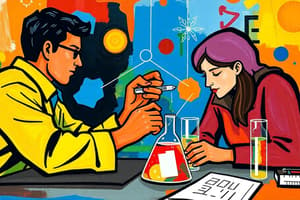Podcast
Questions and Answers
Which branch of science focuses on non-living systems?
Which branch of science focuses on non-living systems?
- Physical Science (correct)
- Environmental Science
- Life Science
- Earth Science
What is the first step in the scientific method?
What is the first step in the scientific method?
- Experimentation
- Observation (correct)
- Conclusion
- Hypothesis
Which of the following is NOT a type of energy?
Which of the following is NOT a type of energy?
- Kinetic
- Pressure (correct)
- Thermal
- Chemical
According to Newton's second law, what does force equal?
According to Newton's second law, what does force equal?
What does cell theory propose about living organisms?
What does cell theory propose about living organisms?
Which law states that energy can neither be created nor destroyed?
Which law states that energy can neither be created nor destroyed?
What is the term for anything that has mass and takes up space?
What is the term for anything that has mass and takes up space?
What is an example of a current topic in general science?
What is an example of a current topic in general science?
Which of the following is not a property of matter?
Which of the following is not a property of matter?
What does the law of thermodynamics say about entropy?
What does the law of thermodynamics say about entropy?
Flashcards are hidden until you start studying
Study Notes
Overview of General Science
- Definition: Study of the natural world through observation, experimentation, and analysis.
- Branches:
- Physical Science: Includes physics and chemistry; focuses on non-living systems.
- Life Science: Involves biology, ecology, and related fields; studies living organisms.
- Earth Science: Covers geology, meteorology, oceanography, and astronomy; examines Earth and its place in the universe.
Key Concepts
-
Scientific Method:
- Observation: Gathering data and noting phenomena.
- Hypothesis: Formulating a testable statement.
- Experimentation: Conducting tests to verify or refute the hypothesis.
- Analysis: Interpreting data and results.
- Conclusion: Drawing insights and potentially developing new hypotheses.
-
Matter:
- Definition: Anything that has mass and takes up space.
- States: Solid, liquid, gas, and plasma.
- Properties: Physical (observable) and chemical (behavior in reactions).
-
Energy:
- Types: Kinetic, potential, thermal, chemical, electrical, and nuclear.
- Law of Conservation: Energy cannot be created or destroyed, only transformed.
Fundamental Laws and Theories
-
Newton's Laws of Motion:
- An object in motion stays in motion unless acted upon by an external force.
- Force equals mass times acceleration (F=ma).
- For every action, there is an equal and opposite reaction.
-
Laws of Thermodynamics:
- Energy can neither be created nor destroyed.
- The total entropy of an isolated system always increases.
- Absolute zero is unattainable in any physical process.
-
Cell Theory:
- All living things are made up of cells.
- Cells are the basic unit of life.
- All cells arise from pre-existing cells.
Current Topics in General Science
- Climate Change: Study of global warming impacts and environmental shifts.
- Genetic Engineering: Modifying organisms' DNA for desirable traits.
- Artificial Intelligence: Intersection of computer science and cognitive sciences for creating intelligent machines.
Importance of General Science
- Provides foundational knowledge for various disciplines.
- Encourages critical thinking and problem-solving skills.
- Enhances understanding of technological advancements and their implications.
General Science Overview
- The study of the natural world through observation, experimentation, and analysis.
Branches of General Science
- Physical Science: Studies non-living systems such as physics and chemistry.
- Life Science: The study of living organisms, including biology and ecology.
- Earth Science: Investigates Earth and its place in the universe, including geology, meteorology, oceanography, and astronomy.
Key Concepts in General Science
-
Scientific Method: A systematic approach to understanding the natural world:
- Observation: Gathering information about the world through senses and tools.
- Hypothesis: A testable statement attempting to explain an observation.
- Experimentation: Conducting tests to support or refute the hypothesis.
- Analysis: Interpreting the data from the experiment.
- Conclusion: Drawing conclusions and potentially generating new hypotheses.
-
Matter: Anything that has mass and takes up space.
- States of matter: Solid, liquid, gas, and plasma.
- Properties of matter: Physical (observable) and chemical (behavior in reactions).
-
Energy: The ability to do work.
- Types of energy: Kinetic, potential, thermal, chemical, electrical, and nuclear.
- Law of conservation of energy: Energy cannot be created or destroyed, only transformed.
Fundamental Laws and Theories
-
Newton's Laws of Motion: Describe the relationship between force, mass, and motion.
- First Law: An object in motion stays in motion unless acted upon by an external force.
- Second Law: Force equals mass times acceleration (F=ma).
- Third Law: For every action, there is an equal and opposite reaction.
-
Laws of Thermodynamics: Describe how energy flows and transforms in physical systems.
- First Law: Energy cannot be created or destroyed.
- Second Law: The total entropy of an isolated system always increases.
- Third Law: Absolute zero is unattainable in any physical process.
-
Cell Theory: Explains the fundamental unit of life.
- All living things are made up of cells.
- Cells are the basic unit of life.
- All cells arise from pre-existing cells.
Current Topics in General Science
- Climate Change: The study of global warming and its impacts on the environment.
- Genetic Engineering: The modification of organisms' DNA to produce desirable traits.
- Artificial Intelligence: The intersection of computer science and cognitive sciences to create intelligent machines.
Importance of General Science
- Provides foundational knowledge for many disciplines.
- Encourages critical thinking and problem-solving skills.
- Enhances understanding of technological advancements and their implications.
Studying That Suits You
Use AI to generate personalized quizzes and flashcards to suit your learning preferences.




